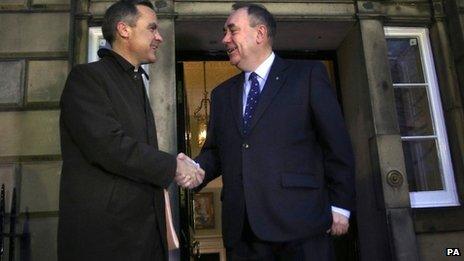The sterling price of Scottish independence
- Published
- comments

The governor of the Bank of England says he is not giving a view on whether Scottish independence would be good or bad for Scotland and its people
But Mark Carney will have an influence on the fractious debate over Scotland's future, because of the implications of his assessment of Alex Salmond's ambition that a separate Scotland would be in a sterling currency union with the rest of the UK.
The nub of his analysis is that successful currency unions pool considerable amounts of sovereignty over fiscal - or tax and spending - decisions.
And that currency unions that endure existential traumas (a big hello to our friends in the eurozone) tend to be those lacking the ability to share their public-sector financial resources, and which have limited controls over the propensity of union members to behave in an economically reckless way.
Or to put it another way, opting to be independent within a successful currency union would represent a very constrained form of independence. A Scottish government would have far less ability to tax and spend as it chose, than if it had its own currency - or so Mr Carney makes clear.
Which carries two implications.
First, independence within a currency union might not properly satisfy the yearning for self-determination of diehard activists, since their ability to manage their economy would be limited.
Second, the business of negotiating the terms of a currency union with the rest of the UK would be both make-or-break for Scottish prosperity and hugely complex.
Economic shock?
It won't therefore surprise you that the Treasury has seized on Mr Carney's speech to reinforce its view that negotiations on a currency union would be "highly unlikely to be agreed".
But, you may ask, why the need for Scotland's budgetary independence to be curtailed in the event of currency union?
Well, on Carney's view - which merely translates conventional economic theory - one reason would be to prevent a Scottish economic downturn becoming excessively painful for Scottish people.
Imagine there was an economic shock that were to hurt Scotland more than the rest of the UK. This could, for example, be a collapse in the oil price, if Scotland were to end up as owner of all that North Sea oil.
In fact in those circumstances, the energy price fall would probably benefit the economy of the rest of the UK (RUK) because costs for businesses and households would fall.
Which means that the economies of Scotland and that of RUK would diverge.
Tax revenues
Now the value of the pound would tend to reflect economic conditions in the larger economic area of England, Wales and Northern Ireland, not the more recessionary conditions in Scotland.
So the pound would not fall to offset the downturn in Scotland and give a boost to the export prospects of Scottish companies. And nor could the Bank of England, setting interest rates, reduce those interest rates to help the hurting Scots people, because they would be in the minority as a part of the whole sterling union.
Which means that economic activity in Scotland would probably decline more than would happen if it had its own currency.
And that in turn would lead tax revenues for the Scottish government to fall disproportionately more - at a time when Scottish unemployment would be on the rise and the Scottish government's expenditure would be rising on social security and benefit payments.
So the financial position of the Scottish government would be disproportionately impaired (its deficit would rise) - bringing the dangerous risk, perhaps, of the government defaulting on its debts.
In other words, within a currency union, there would be a strong need for governments to call on a common pool of resources to cushion the effect of such shocks.
This would involve, in our hypothetical case, taxpayers from the rest of the UK helping to finance Scottish unemployment benefits for a period.
'Moral Hazard'
But RUK taxpayers would only be prepared to do this, if confident that the Scottish government could not spend willy nilly in either good times or bad.
Or to put this in the tedious terms beloved by economists, any safety net agreed between the governments to bail out Scotland or RUK in a crisis would carry as a corollary strict rules on how much each government could tax and spend, to prevent "moral hazard" - or the danger that the Scots (in this case, but the same would apply to RUK) would not go spending bonkers, knowing that RUK taxpayers would bail them out.
And the same sort of fetters would have to be imposed for a second related reason, namely that a currency union implies banking union - and RUK taxpayers would only be prepared to stand behind the liabilities of Scottish banks, if those banks were subject to tight controls on their freedom to lend and invest.
The imperative of shackling banks is doubly important when Scottish banks would inevitably hold the debt of the Scottish government, so would be weakened in our hypothetical example by any impairment of the credit worthiness of the Scottish government.
And, if you doubt any of this, think for a second about how miserable life has been for the Spanish, Irish, Greeks, Portuguese and Cypriots in recent years, in a currency union where there is no common unemployment safety net and no shared pool of money to prop up ailing banks.
So whether he intended to do so or not, Governor Carney has just lobbed a very large stink bomb into the centre of Edinburgh.